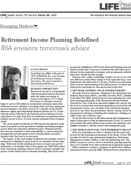LIFE & Health Advisor April, 2010.
 BUSINESS OPPORTUNITY
BUSINESS OPPORTUNITY
Retirement income is a demographically-driven phenomenon that represents the largest movement of money in the history of U.S. financial services. As Boomer investors begin to convert $20 trillion in accumulated retirement assets into
retirement income, winning or retaining clients and their retirement assets is integral to the future success of a majority of the 600,000 insurance agents and independent financial advisors in U.S. In line with the needs of Boomers, the financial services industry is in the early phases of a shift away from its traditional accumulation-driven business model in favor of a new, income payments-driven business model.
The stock market breakdown in 2008 exposed the inherent weaknesses in popular income-generation strategies including managed payout funds and systematic withdrawal plans. Financial advisors have become sensitized to their responsibility to create retirement strategies that provide greater levels of predictability and safety. Industry wide, the focus is on outcomes.
The impact of the stock market breakdown has, perhaps, caused a permanent re-thinking by many focused on retirement income planning. Traditional income planning processes in many cases proved inadequate or incomplete when tested against the 2008-2009 market. Some retirement planning oriented advisors endured a painful reappraisal of their beliefs about retirement investing. This can be seen in research published in 2009 by the Financial Planning Association which revealed that 50 percent of advisors who had relied upon traditional income-generation strategies such as systematic withdrawal plans have abandoned the strategy.
Industry wide, a shift is unfolding. I believe we are at one of those rare inflection points where change is both rapid and deep, creating implications that will be felt for decades. Fueled by an increasingly more accurate understanding of the full spectrum of retirees needs, advisors are embracing an outcome-focused world view.
A NEW BOOK OFFERING MUCH-NEEDED INSIGHTS
Recently, Francois Gadenne, Chairman of the Retirement Income Industry Association (RIIA), and Mike Zwecher, Ph.D., published a book called The RIIA Advisory Process that underpins the retirement planning philosophy of the Retirement Income Industry Association. One of the most important insights that emerge from the book is a notion that retirement planning is mostly about risk management. In fact, one can think of the retirement planning process as one where the practitioners allocate among various risk management techniques including risk transference, hedging, mortality credits and a risk-free asset.
To say that this concept of allocation among risk management techniques is important is really an understatement. In fact, it’s vital for most retirees. But many advisors may not have the experience and insights necessary to craft the retiree’s risk management plan.
A NEW DESIGNATION FOR A NEW RETIREMENT REALITY
RIIA has undertaken an effort to furnish both the vision and process for the retirement professional of the future. In fact, RIIA recently awarded its new professional designation, Retirement Management Analyst (RMA), to the first graduating class. The RMA is meant to convey a level of retirement planning expertise that is not available from other professional designation programs.
RMA candidates complete a program of study before taking an examination based upon the RIIA Advisors Process textbook and other required readings including Retirement Portfolios: Theory, Construction, and Management by Michael Zwecher.
Typically, a candidate will have at least five years experience as a financial advisor working with clients broadly on retirement and nonretirement portfolios, or comparable experience in the financial services industry directly involved in the retirement and investments business.
Having now gone through the process I can enthusiastically recommend it to any advisor who wishes to maximize his or her success in retirement planning.
Advisors who seek out and successfully complete the RMA studies will acquire two types of professional advantage. First, they will become better at their jobs; more effective at implementing the planning techniques that matter most to retirees.
Secondly, advisors who earn the RMA designation will gain a form of competitive advantage which will help them win retirement planning clients and their assets. RMA advisors will be equipped to more effectively convey their professional competency and build confidence among investors. A prospective client having an initial conversation with an RMA advisor will quickly discover that the RMA offers a world view that’s different form accumulation-oriented advisors. Accumulation-oriented advisors tend to promote “hope,” while RMAs tend to focus on outcomes.
HUB & SPOKE
The RMA advisors process is based upon a hub and spoke model. The client is at the center of the process with the spoke arrayed around the client. Each spoke addresses key planning concepts including:
- Assessing the retiree’s risks
- Focusing on human and social capital
- Creating the household balance sheet
- Allocating among risk management techniques
- Creating a life-cycle profile, and,
- Choosing the correct products
Essential to the RMA process is the philosophy of, “first build a floor and then expose to upside.” This construct places a high priority on creating a baseline of retirement income to meet the client’s essential expenses, before, in accordance with individual needs and objectives, exposing the appropriate share of retirement assets to upside growth potential.
A SUCCESSFUL FUTURE IN RETIREMENT PLANNING
Retirement planning professionals are beneficiaries of what may be the most significant business opportunity in the history of financial services. It’s well understood that tens of millions of Boomer clients need expert retirement planning guidance. But while many advisors recognize the scale of the opportunity, not many have yet mastered the new advisory process that is so critical to their clients’ financial success in retirement.
Making a commitment to acquiring the knowledge needed to better serve retirees’ needs is the first critical step in maximizing your personal success in retirement planning.
Reproduced with permission from LIFE & Health Advisor, P.O. Box 613, Walpole, MA 02081 The Journal for the Financial Services Industry
